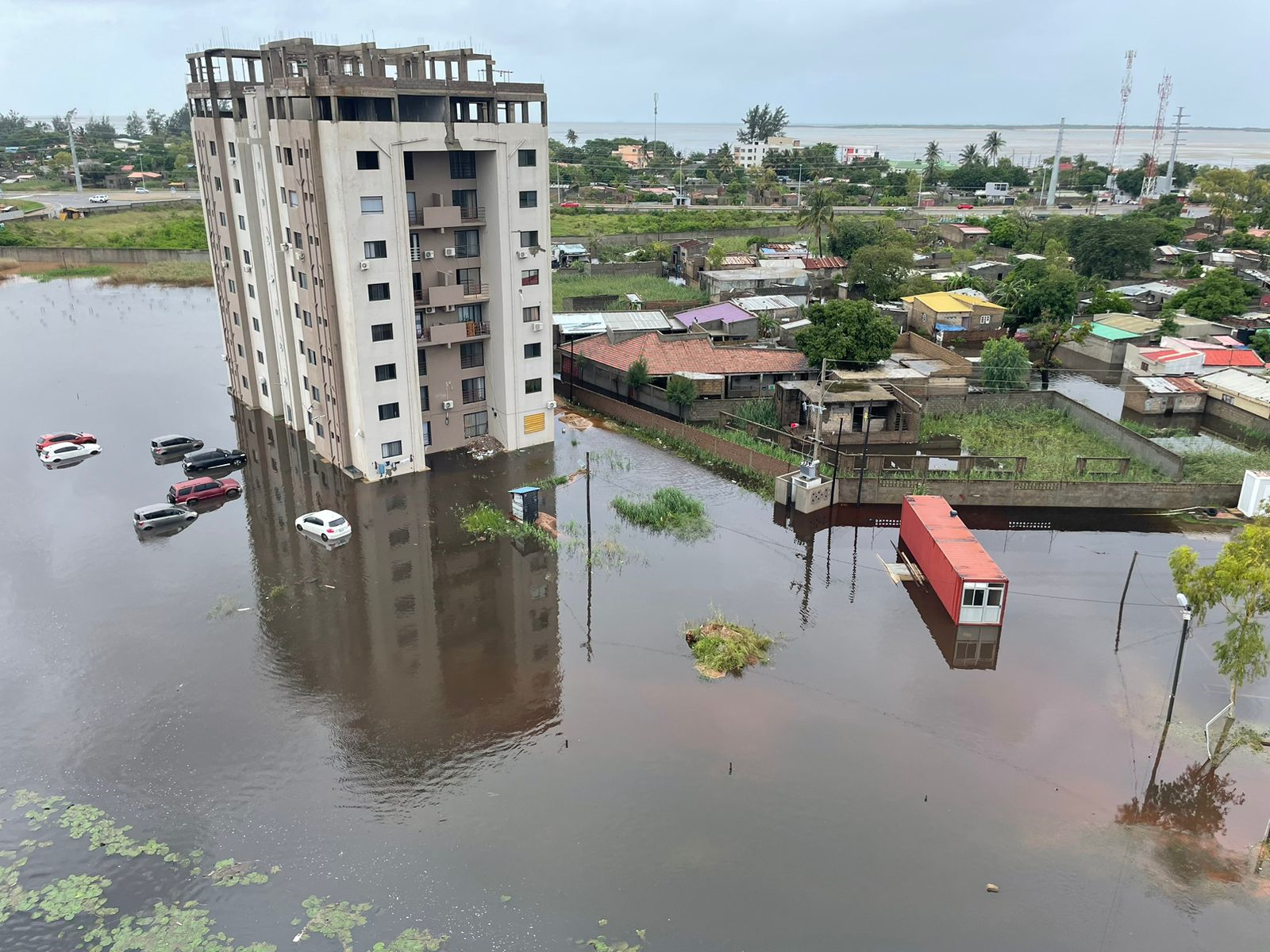
Barely a year after the deadly Cyclone Freddy devastated Mozambique, Tropical Storm Filipo, another storm, and flooding is wreaking havoc across communities in several parts of the south of the country, including the capital city Maputo.
Well over 56,000 people and 10,000 families have suffered injuries, with two deaths reported. Global Shelter Cluster reports that approximately 2,739 houses have been partially damaged, 139 houses were completely damaged, and 6,811 homes flooded. Further, 146 schools (22,442 students) were affected along with 51 health centers, 56 electric poles, and 19 roads. The lack of preparedness by the Mozambican government and world leaders alike to address humanitarian disasters like this has made the impacts more grievous for the citizens, especially the poorest and most vulnerable ones.
According to the International Organization for Migration (IOM), the National Institute for Disaster Management (INGD), UNICEF, WFP and OCHA, food, clean water, sanitation, health, and shelter are the most urgent needs identified through a joint multisectoral assessment for the provinces of Gaza, Inhambane, Maputo and Sofala. There is also an urgent need for resettlement, reconstruction, and rehabilitation of partially/completely damaged homes.
This disaster comes at a time when a range of communities and civil society groups – including Justiça Ambiental JA! (Friends of the Earth Mozambique) – continue to campaign against the expansion of gas exploitation in the northernmost province of Cabo Delgado. Transnational giants TotalEnergies, ExxonMobil, Eni, and others blatantly ignore all opposition, and continue to develop three expensive liquified natural gas ( LNG) projects costing about $50 billion. These projects will contribute to greenhouse gas emissions. Gas exploration is also being developed in Nampula and Inhambane provinces of Mozambique.
As it stands, the Mozambique gas projects have displaced hundreds from their homes, brought devastating consequences for community peoples, their land, their livelihoods, and their climate — and have caused the country to incur more debt. Furthermore, activists, community leaders, and journalists are facing repression and shrinking civic space in the country, especially associated with the expansion of the gas industry.
Executive Director of JA! Anabela Lemos says
Mozambique is one of the countries most affected by the climate crisis. We see this playing out in front of our eyes, with extreme weather events destroying lives livelihoods, and communities. This must serve as a compelling wake-up call urging the world to transition away from fossil fuels towards 100% safe, affordable renewable energy for everyone. We must live in harmony with nature, otherwise lives are constantly in danger.
Addressing the question of accountability for the losses and damages incurred by affected populations is paramount. Urgent action is required to ensure that those who are most vulnerable do not bear the burden of debts they did not incur, nor continue to suffer the consequences of a climate crisis they did not cause. This necessitates a comprehensive and equitable approach to reparations, potentially involving international mechanisms for compensation and assistance, as well as robust policies aimed at climate justice and adaptation financing.
Nerisha Baldevu, Friends of the Earth Africa (FoE Africa) coordinator believes that “Multinational corporations operate with impunity across the continent of Africa, pretending their exploitation of peoples, lands and resources are for our “development”! This lie must stop. Their power must be curbed. Their actions are destroying our planet, and leading to ever more devastating storms like Filipo (and Idai, five years ago), which impact our already struggling communities the most.
Maimoni Ubrei-Joe, Friends of the Earth Africa Climate Justice and Energy Coordinator says
The recurring climate crisis in Mozambique comes as no surprise, as a result of the consistent warnings from multiple IPCC reports highlighting Africa’s heightened vulnerability to climate change, despite its minimal role in causing it. Regrettably, rather than extending genuine support to Mozambique for building resilience to these climate disasters, the governments of the Global North and Europe have opted to exploit the southern African nation as a convenient gas station.
The demand for gas in the future is uncertain, and the LNG projects have been linked to increased violence in Cabo Delgado. The transition from dirty energy to clean renewable energy is a very clear possibility with the reality of things in the world today, these new oil and gas infrastructures may end up becoming stranded assets with this pace of the transition and would continue to fuel the global climate crisis and the ones currently being experienced in Mozambique.
We call on the government of Mozambique as well as other African leaders, investing banks, and multinational companies to stop funding the opening of our lands and waters to the expansion of oil and gas, which will exacerbate the sufferings and impacts of climate change on the peoples of Africa. The need for climate finance to help the suffering people adapt to these impacts has become more urgent. The Loss and Damage fund operationalized during the last Conference of Parties in Dubai has got to go beyond meager pledges. Those who have the historical responsibility for the climate crisis need to take the lead indeed.
Friends of the Earth Africa hereby call on:
- Relevant government institutions provide urgent assistance including food, clean water, sanitation, health services, and shelter to communities affected by climate disasters like Tropical Storm Filipo and other extreme weather events.
- Relevant government institutions and bilateral entities to implement plans for the resettlement, reconstruction, and rehabilitation of homes damaged or destroyed by climate-related events, ensuring affected populations are supported in rebuilding their lives.
- Mozambican government needs to hold multinational oil and gas corporations accountable for the environmental and social impacts of their operations, including displacement of communities and destruction of livelihoods.
- Multinational oil and gas corporations and development Banks cease funding and support for the expansion of oil and gas projects in regions like Cabo Delgado, Mozambique, which exacerbate the impacts of climate change and harm local communities.
- World leaders to transition swiftly from fossil fuels to 100% renewable energy sources commit to reducing greenhouse gas emissions and mitigating the severity of future climate-related disasters.
- World leaders to increase financial support for climate adaptation and resilience-building efforts in vulnerable regions, ensuring adequate resources are available to assist communities in adapting to the impacts of climate change.
- World leaders to establish mechanisms for providing compensation and assistance to communities disproportionately affected by climate-related disasters, ensuring that those who suffer the most receive support.
- Governments at all levels to safeguard the rights of activists and journalists who speak out against environmental injustices and human rights abuses associated with fossil fuel projects, ensuring their safety and freedom of expression.
- Governments at all levels to enact regulations to limit the power and impunity of multinational corporations operating in Africa, ensuring that their activities prioritize the well-being of communities and the environment over profit.
